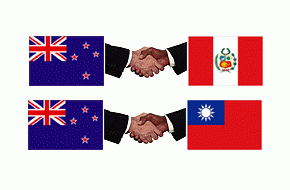
By Allan Barber
The TPP may not be happening as soon as expected, but free trade agreements with individual markets, Chinese Taipei and Peru, will come into effect, some aspects immediately, and provide more immediate rewards for our exporters.
Although multilateral trade negotiations make more dramatic headlines, history suggests that they have a similar gestation period to an elephant, in fact quite a bit longer in the case of WTO rounds.
The TPP looks as if it will follow a similar course because of the USA’s demands about trade partners’ internal arrangements, like Pharmac, and farmer lobbies in countries like Japan and South Korea.
This makes it extremely difficult to conclude a binding agreement that meets the requirements of all the countries participating in the negotiations.
Unilateral trade agreements are not as highly regarded or sought after, but they are an essential part of international trade and, for New Zealand with its high trade dependency, very important to our future prosperity.
They require a huge amount of preparation and work behind the scenes by government agencies, in this case MPI and Foreign Affairs and Trade, but also trade bodies such as Meat Industry Association, Beef + Lamb NZ and others which offer advice and information.
The Chinese Taipei agreement will result in tariff savings of nearly $40 million on current trade figures.
This is great news for our exporters and is set to get greater because tariffs on beef will be eliminated from 1 January 2015. Bovine offals, casings, hides and skins are duty free with immediate effect.
Current meat and co-product exports total more than $200 million annually.
Furthermore within three years kiwifruit tariffs will be eliminated and in four years time, tariffs will no longer be levied on our exports of sheep meat, honey and most fish products.
Once the agreement is fully implemented, in year eight, tariff savings are estimated to reach $75 million and given the experience of other agreements, we can safety assume savings are likely to be much higher as our trade expands.
Tariffs on 98.5 percent of our trade with Chinese Taipei will be eliminated by year four.
-------------------------------------------------------------------------------------------------------------------------------------------
Farms For Sale: the most up-to-date and comprehensive listing of working farms in New Zealand, here »
-------------------------------------------------------------------------------------------------------------------------------------------
Approval of imports of red meat and offal products by SENASA, Peru’s government agency responsible for animal products, opens up a market of over $20 million a year in addition to dairy exports to Peru which total $120 million.
Peru was a significant, if small, market for our red meat back in the 1980s, but since then there has been a total restriction on imports of meat related products from New Zealand because of regulatory changes.
The next big target for a unilateral trade agreement must be sheepmeat access to India which would add another alternative to EU and China as a valuable market option.
None of these agreements will bring about a sea change in the profitability or sustainability of New Zealand’s red meat sector, but each one helps to create a more favourable global trading environment for our exports.
---------------------------------------------------------------------------------------
Here are some links for updated prices for
- lamb
- beef
- deer
- wool
No chart with that title exists.
---------------------------------------------------------------------------------------
Allan Barber is a commentator on agribusiness, especially the meat industry, and lives in the Matakana Wine Country where he runs a boutique B&B with his wife. You can contact him by email at allan@barberstrategic.co.nz or read his blog here ».
1 Comments
Just recently I saw in the media big articles about a buttermilk lake....
There's just so much milk we can't move it says Fonterra. (butter is the cheap & easy storable product)...
Reading today. Theo is signing up EU farms for whey supplies...we need more local milk supplies says Fonterra....
Something smells, and I don't think it's the lake...

We welcome your comments below. If you are not already registered, please register to comment
Remember we welcome robust, respectful and insightful debate. We don't welcome abusive or defamatory comments and will de-register those repeatedly making such comments. Our current comment policy is here.